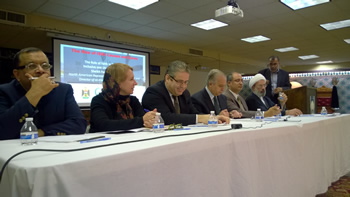Confronting Extremism at a Civil Society Level - A Special Forum held by Permanent Mission of Iraq, UNITAR and Organization for Islamic Cooperation
8 November, New York, USA – The UNITAR New York Office co-sponsored with permanent Mission of Iraq to the UN and the Organization for Islamic Cooperation (OIC) a special forum on the topic Confronting Extremism: Faith-Based Community Initiatives towards Positive Diversity, Protecting Minorities and Enhancing Accountability and Good Governance. Held at the Al-Khoei Foundation in New York, the event brought together scholars, diplomats, religious figures and government officials, who discussed methods to combat extremism at a civil society level.
H.E. Mr. Mohamed Ali Alhakim, Permanent Representative of the Republic of Iraq to the United Nations opened the forum. Ambassador Alhakim outlined the causes of the present instability in Iraq, as well as the means to address it. He stressed that Iraqi society has long been marked by a sense of pluralism and cohesiveness, and that the path to future stability was already present in its cultural make-up. Alhakim was followed by H.E. Mr. Ufuk Gokcen, Permanent Observer of the Organization of Islamic Cooperation to the United Nations. Ambassador Gokcen stressed that the extremist actions are out of line with the actual spirit of Islam, were instead a by-product of poverty, alienation and ignorance.
The extremist actions are out of line with the actual spirit of Islam, were instead a by-product of poverty, alienation and ignorance.
Ambassador Gokcen.
He called on religious leaders, both at the local and global level, to denounce such practices.
 Following the Ambassadors’ presentations, Ms. Yvonne Lodico, Head of the UNITAR New York Office, spoke on the topic of inclusive governance and social cohesion. She stressed that building institutional capacity in new democracies was a difficult but critical process, and that the development of a robust civil society is necessary to complement and bolster the formal democratic process. Ms. Lodico was followed by Dr. Hasnain Walji, Former President of the World Federation of Khoja Shia Ithna-Asheri Muslim Communities. Dr. Walji highlighted the federation’s role in fighting poverty and providing education, which, he noted, helped combat some of the root causes of extremism.
Following the Ambassadors’ presentations, Ms. Yvonne Lodico, Head of the UNITAR New York Office, spoke on the topic of inclusive governance and social cohesion. She stressed that building institutional capacity in new democracies was a difficult but critical process, and that the development of a robust civil society is necessary to complement and bolster the formal democratic process. Ms. Lodico was followed by Dr. Hasnain Walji, Former President of the World Federation of Khoja Shia Ithna-Asheri Muslim Communities. Dr. Walji highlighted the federation’s role in fighting poverty and providing education, which, he noted, helped combat some of the root causes of extremism.
Two members of the Al-Khoei Foundation closed the forum. With reference to the situation in Iraq, Mr. Syed Meesam Razvi, the foundation’s United Nations Representative, suggested a number of methods which could foster a sense of nationhood which transcends sectarian identity. Among his suggestions were: the creation of a national soccer league whose teams would take in multiple sects, the establishment of ‘town hall meetings’ with government figures to foster a sense of civic process, and the creation of national holidays that celebrate shared aspects of Iraqi culture such as food, history and poetry. The final presentation was made by Sheikh Fadhel Al-Sahlani, Sheikh of the Foundation’s New York congregation, who again stressed the role of religious leaders in promoting peace, and argued that a proper understanding of Islam helps undermine the message of extremist groups.
Broadly speaking, the conference stressed the link between a robust civil society and the improvement of governance and security. Presenters noted the role of religious groups, charities, government programs and educational institutions in fostering a sense of belonging and social empowerment. It was agreed that these community-based mechanisms could act as a powerful means of counteracting sectarian divisions and confronting the root causes of extremism.
Related links
Watch a video recording of the conference.
Ms. Lodico’s presentation transcript.
Photo: Panelists at the event

